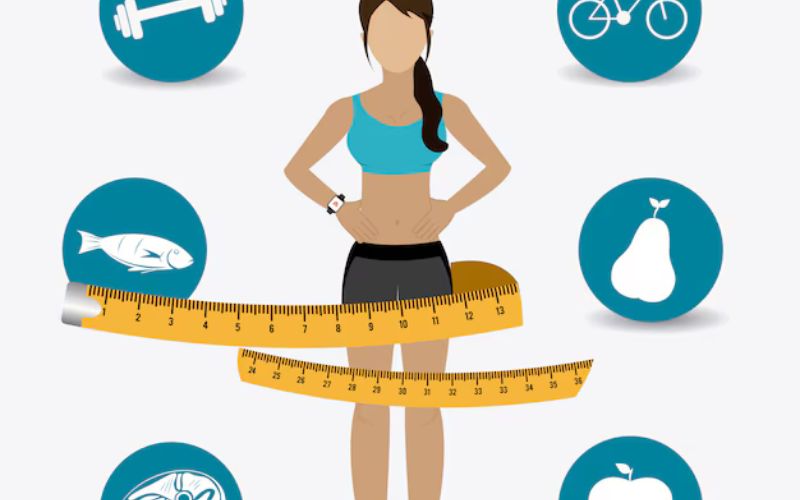Weight loss is a challenging journey that requires a comprehensive approach. For those struggling with weight management, seeking professional medical help can provide the necessary guidance and support.
This blog post will help you understand the different types of doctors who specialize in weight loss, their roles, and how they can assist you. We'll also discuss the best weight loss programs and meal plans, incorporating expert opinions and actionable tips. This information is brought to you by KJ Aesthetics, with insights from Dr. Vishal Brahmbhatt.
Understanding the Importance of Medical Assistance in Weight Loss
Weight loss is influenced by various factors such as genetics, metabolism, medical conditions, and psychological factors. Medical professionals can offer personalized and scientifically-backed strategies for effective weight management.

Types of Doctors Specializing in Weight Loss
Primary Care Physicians (PCPs)
Primary care physicians are often the first point of contact for weight loss advice. They provide general health assessments, diagnose underlying conditions, and recommend basic weight loss strategies.
Best Weight Loss Program and Meal Plan
PCPs may recommend a balanced diet and regular exercise. They can also provide referrals to nutritionists or dietitians for personalized meal plans.
Endocrinologists
Endocrinologists specialize in hormonal imbalances that can affect weight. They are particularly helpful for individuals with conditions like thyroid disorders, diabetes, or metabolic syndrome.
Best Weight Loss Program and Meal Plan
Endocrinologists may prescribe medications to regulate hormones and suggest dietary changes to manage blood sugar levels.
Bariatricians
Bariatricians are doctors who specialize in the medical treatment of obesity. They offer non-surgical treatments and work with patients to develop comprehensive weight loss plans.
Best Weight Loss Program and Meal Plan
Bariatricians may recommend very low-calorie diets, prescription medications, and behavioral therapy.
Nutritionists and Dietitians
Nutritionists and dietitians are experts in food and nutrition. They can create personalized meal plans that cater to your dietary needs and weight loss goals.
Psychologists and Psychiatrists
Psychologists and psychiatrists can help address the psychological aspects of weight loss. They can provide therapy for emotional eating, body image issues, and other mental health concerns related to weight.

Best Weight Loss Program and Meal Plan
Therapists can offer cognitive-behavioral therapy (CBT) and other therapeutic approaches to support healthy eating behaviors.
Which Treatment is Best for Weight Loss?
The best treatment for weight loss depends on various factors such as your health condition, weight loss goals, and personal preferences. Here are some effective treatments
Lifestyle and Behavioral Modifications
Overview
Lifestyle changes, including a balanced diet and regular physical activity, form the foundation of any weight loss program. Behavioral modifications such as setting realistic goals, self-monitoring, and seeking support can enhance the effectiveness of these changes.
Benefits
Sustainable and long-term results
Improved overall health
No side effect
Medications
Overview
Prescription weight loss medications can help individuals who struggle with obesity and have not had success with lifestyle changes alone. These medications work by reducing appetite, increasing feelings of fullness, or decreasing fat absorption.
Examples
Orlistat (Xenical)
Phentermine-topiramate (Qsymia)
Liraglutide (Saxenda)
Benefits
Can help achieve significant weight loss
Often used in combination with lifestyle changes
Considerations
Potential side effects
Requires a prescription and medical supervision
Bariatric Surgery
Overview: Bariatric surgery is an option for individuals with severe obesity or obesity-related health conditions. It includes procedures like gastric bypass, sleeve gastrectomy, and adjustable gastric banding, which alter the digestive system to help with weight loss.
Benefits:
Significant and rapid weight loss
Improvement or resolution of obesity-related conditions like type 2 diabetes and hypertension
Considerations:
Requires a thorough evaluation and medical supervision
Potential risks and complications associated with surgery
What is the Best Test for Weight Loss?
The best test for weight loss depends on identifying underlying factors that may be contributing to weight gain or difficulty losing weight. Here are some common tests:
Body Mass Index (BMI) Calculation
Overview: BMI is a simple calculation using height and weight to classify underweight, normal weight, overweight, and obesity.
Benefits
Easy to calculate
Provides a general indication of weight-related health risks
Blood Tests
Overview: Blood tests can help identify underlying medical conditions that may affect weight, such as thyroid disorders, diabetes, and hormonal imbalances.
Examples:
Thyroid function tests (T3, T4, TSH)
Blood glucose and insulin levels
Lipid profile (cholesterol and triglycerides)
Hormone levels (e.g., cortisol, leptin, ghrelin)
Benefits:
Identifies medical issues that need to be addressed
Guides personalized treatment plans
Metabolic Testing
Overview: Metabolic tests measure the rate at which your body burns calories (resting metabolic rate) and how efficiently it uses oxygen during exercise (VO2 max).
Benefits:
Helps tailor exercise and diet plans
Provides detailed information on metabolic health
Body Composition Analysis
Overview: Body composition tests measure the percentage of fat, muscle, and bone in your body. Techniques include bioelectrical impedance analysis (BIA), dual-energy X-ray absorptiometry (DEXA), and skinfold measurements.
Benefits:
Provides a detailed understanding of body fat and muscle mass
Useful for tracking progress beyond just weight loss
Medications
Overview: Prescription weight loss medications can help individuals who struggle with obesity and have not had success with lifestyle changes alone. These medications work by reducing appetite, increasing feelings of fullness, or decreasing fat absorption.
Examples:
Orlistat (Xenical)
Phentermine-topiramate (Qsymia)
Liraglutide (Saxenda)
Meal Plans for Weight Loss
Creating a meal plan tailored to your needs can help you achieve your weight loss goals. Here are some tips and examples:
Balanced Meal Plan
Breakfast: Greek yogurt with berries and a sprinkle of granola
Lunch : Grilled chicken salad with mixed greens, cherry tomatoes, cucumbers, and a vinaigrette dressing
Dinner: Baked salmon with quinoa and steamed broccoli
Snacks: Apple slices with almond butter, Carrot sticks with hummus
Low-Carb Meal Plan
Breakfast: Scrambled eggs with spinach and feta cheese
Lunch: Cobb salad with turkey, avocado, boiled egg, and blue cheese dressing
Dinner: Stir-fried tofu with mixed vegetables
Snacks: Cheese sticks, Nuts and seeds
Plant-Based Meal Plan
Breakfast: Smoothie with almond milk, banana, spinach, and chia seeds
Lunch: Quinoa and black bean bowl with avocado and salsa
Dinner: Lentil soup with a side of whole grain bread
Snacks: Edamame, Fruit salad)
Frequently Asked Questions (FAQ)
The best way to start a weight loss program is to consult with a healthcare professional or a certified nutritionist. They can help you set realistic goals, create a personalized plan, and provide guidance on diet, exercise, and lifestyle changes.
Conclusion
Understanding the difference between a skin doctor and a dermatologist is crucial for making informed decisions about your skin health.
Dr. Vishal Brahmbhatt Dermatologists offer Weight loss is a complex journey that benefits greatly from professional medical guidance. Whether you seek help from a primary care physician, endocrinologist, bariatrician, nutritionist, or psychologist, each type of doctor offers unique expertise to support your weight loss goals. By choosing the right doctor and following a tailored weight loss program and meal plan, you can achieve and maintain a healthy weight.

